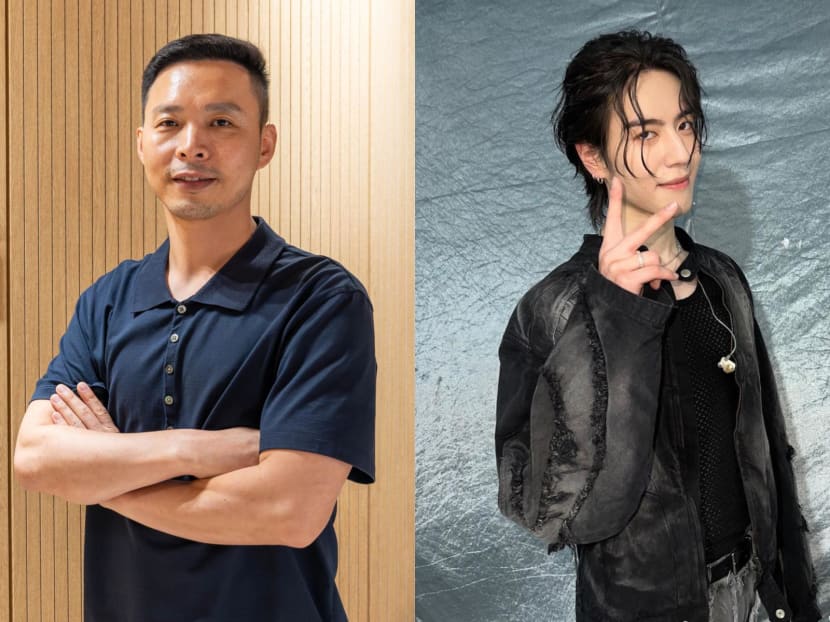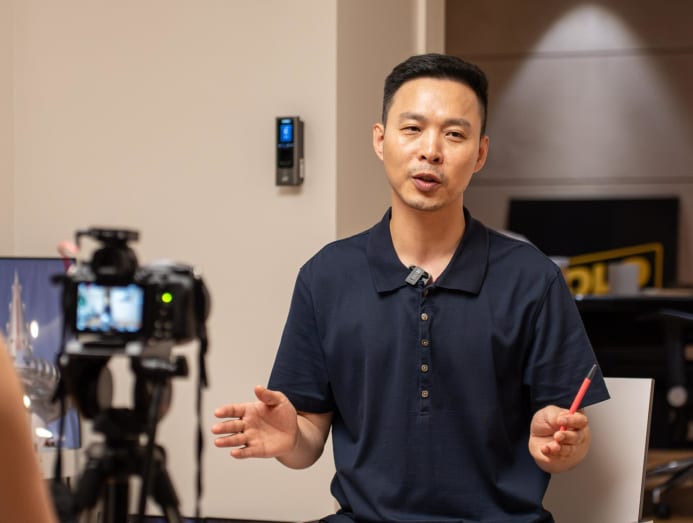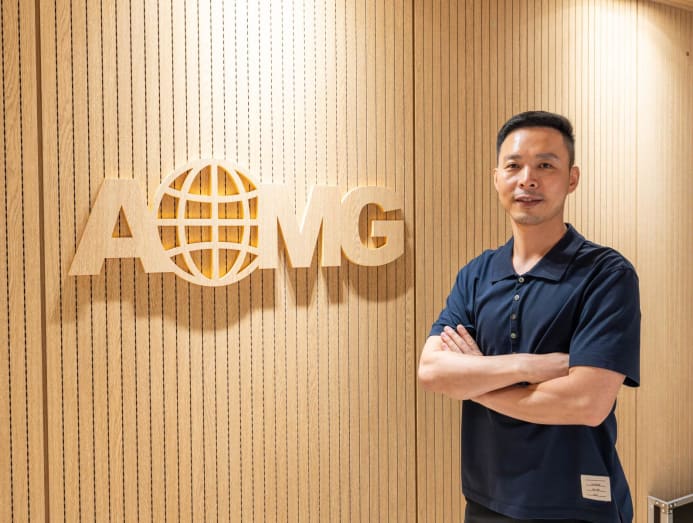Can Korean hip-hop become as big as K-pop? How a music label founded by Jay Park signed GOT7’s Yugyeom
CNA Lifestyle recently spoke with Yoo Deok-gon, the CEO of the popular South Korean hip-hop label AOMG, to get his thoughts on the rise of Korean hip-hop and its close ties with K-pop.

From left: The CEO of South Korean hip-hop label AOMG, Yoo Deok-gon, and GOT7 member Yugyeom. (Photos: Lee Dong-wook, Instagram/yugyeom)

This audio is generated by an AI tool.
When you picture a hip-hop mogul, a soft-spoken man wearing a simple navy blue polo shirt, jeans, and sneakers is probably the furthest image from your mind. Yoo Deok-gon may have only been recently appointed CEO of the popular South Korean hip-hop label AOMG but make no mistake, this man has been instrumental in the rise of K-hip-hop. His portfolio includes being the CEO of record label H1ghr Music and the manager of American rapper Jay Park.
Founded in 2013 by Park, AOMG has been lauded as a cornerstone of the Korean hip-hop scene. In 2019, it became the first hip-hop label to have its own audition programme, Signhere, on TV. AOMG has also been aggressively participating in international music festivals, such as Waterbomb, to attract global fans.
In recent years, it has also expanded its artiste roster to include entertainers outside Korean hip-hop including former mixed martial arts star The Korean Zombie, manhwa artist Kian84, and GOT7 member Yugyeom.
CNA Lifestyle recently spoke with Yoo to get his thoughts on the rise of Korean hip-hop and its future.

WHAT DOES KOREAN HIP-HOP BRING TO THE GLOBAL HIP-HOP SCENE?
Honestly, we used to think that we were just imitating American hip-hop, but now I believe that K-hip-hop is leading the way. Beyond K-hip-hop, there's also K-fashion and freedom and I believe the biggest contribution is the fusion of K-idol music and K-hip-hop.
RECENTLY, THERE HAVE BEEN NUMEROUS COLLABORATIONS BETWEEN K-POP ARTISTES AND K-HIP-HOP ARTISTES. WHAT DO YOU FORESEE FOR THE FUTURE OF THIS TREND?
I think it's a good thing. I see both idols and hip-hop rappers as musicians. Since there's mutual respect, this kind of fusion is happening. We plan to continue collaborating with idol groups and hip-hop musicians moving forward.
SOME BELIEVE THAT K-POP IDOLS WHO RAP AREN’T TRUE RAPPERS. WHAT ARE YOUR THOUGHTS ON THIS?
Oh, not all of them. Some are really good, and some are not as good. Even for the talented ones, when they have to follow the direction set by the company, it can feel a bit manufactured. Personally, I think the distinction between 'rap' and 'hip-hop' has disappeared nowadays. So, I appreciate the freedom they have to express themselves.
HOW DOES K-HIP-HOP INFLUENCE K-POP? WHAT DO YOU THINK OF THE IMPACT THAT ORIGINALLY HIP-HOP-FOCUSED ARTISTES SUCH AS BTS AND BIGBANG HAVE HAD ON K-POP?
It's an essential element. Regardless of whether it's a five-member or four-member idol group, I feel that without rap, the music lacks a certain level of completeness. So, some people who were doing hip-hop also auditioned for idol groups and ended up joining them.
Also, it's about "coolness," you know?
Hip-hop has that "coolness" that comes from fashion and freedom. The fact that rappers became idols also contributed to the growth of K-pop. Without that aspect, K-pop wouldn't have grown as much.
ARE THERE PLANS TO PRODUCE MORE REALITY SHOWS? HAS SIGNHERE HELPED IN DISCOVERING NEW ARTISTES?
The reason we did [Signhere] wasn't just for AOMG to scout talent. We created the programme to provide more opportunities for people. We signed the winner, Sogumm, but that wasn't the main goal. It was actually about furthering the development of hip-hop culture. We did it because we wanted to broaden this culture.
WHAT MOTIVATED YUGYEOM TO JOIN AOMG?
First of all, Yugyeom was one of the GOT7 members who really liked hip-hop music. Not just Yugyeom, but most of them really liked it. But they didn’t know how to get started or how to approach it. Yugyeom said he wanted to take on a challenge. So, even though he was in a big company before, he joined AOMG because he wanted to do something with hip-hop artistes and the crew here.
He ended up joining because one of our choreographers acted as a bridge.
Yugyeom had been active as a member of GOT7 but he wanted to try something different in his career, so he took on the challenge of hip-hop. Now, he’s working very hard at it. His album is not purely hip-hop, but it's evolving step by step from the music he used to do.
DO YOU THINK K-HIP-HOP CAN ACHIEVE SUCCESS SIMILAR TO K-POP? WHAT EFFORTS CAN K-HIP-HOP MAKE TO ACHIEVE SUCH SUCCESS?
I consider K-hip-hop to be part of K-pop as well. So far, we haven't had a specific plan or strategy for working with rappers at our company. But if we can create music that resonates with the public while maintaining the 'freedom' and 'creativity' we've always had, I think it could definitely work. Our goal is to always create ideas and projects that can connect with the public. That's our style. The AOMG style.
DO YOU SEE THE SPREAD OF THE KOREAN WAVE AS A LIMITATION OR AN OPPORTUNITY FOR K-HIP-HOP? ARE THERE CHALLENGES IN ADAPTING TO THE CHANGES AND EXPECTATIONS OF THE PUBLIC, SUCH AS THE DIVERSIFICATION OF ONLINE PLATFORMS?
I always think it’s an opportunity. What I mean is that things are changing really quickly, and we are making efforts to get used to those changes. We've experienced various new things like online fan meetings and fan concerts during COVID-19, and I think these kinds of events will definitely happen again in the future.
Since we've been training ourselves for these things in our own way, I think it will only get better moving forward. Additionally, I want to create diverse content that can help AOMG and Korean K-pop successfully export culture overseas.

AS THE CEO OF AOMG AND A KEY PLAYER IN THE KOREAN MUSIC INDUSTRY, WHAT DO YOU CONSIDER TO BE THE BIGGEST CHALLENGES IN THE KOREAN MUSIC INDUSTRY?
The challenge is thinking that we shouldn't just keep doing the same thing, which creates a constant responsibility to do something new. The most difficult part is figuring out how to successfully merge the creativity of the artistes with the company's creativity to produce the best music and visuals.
SIMILAR TO HOW FOREIGN K-POP IDOLS SING IN KOREAN, DO YOU THINK THE DEMAND FOR FOREIGN ARTISTES TO RAP IN KOREAN REPRESENTS AN OPPORTUNITY FOR KOREAN HIP-HOP AND R&B?
We're looking for it, yes. If we want to work together, the most important thing is empathy with the culture and ideas. Of course, empathy with the concept of the music is important too. I think the most crucial thing is finding common ground between the music the artiste wants to create and the music our company wants to work on with them.
We've done a lot of collaborations with rappers from Japan and Southeast Asia. Just like that, I believe there will be plenty of opportunities for more collaborations if the chance arises. Unlike in the past, I think borders don't really exist anymore. So, I believe that as long as the opportunity is there, anything is possible.
WHY DO YOU THINK MANY KOREAN HIP-HOP LABELS HAVE DISAPPEARED? WHAT IS AOMG’S SURVIVAL STRATEGY?
It's not that they did anything wrong, it's just their personal style. They want to create their own music and express themselves. Rather than saying that AOMG is doing well, I think it's about the respect and sacrifices that exist among the artistes here. There's definitely a mutual respect, and within that respect, there are certain sacrifices.
Also, there are many cases where other labels close down, and there are many cases where artistes start their own company because they want to freely create the music they desire.
CNA Lifestyle was in South Korea at the invitation of South Korea’s Ministry of Culture, Sports and Tourism.







